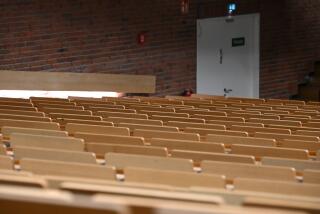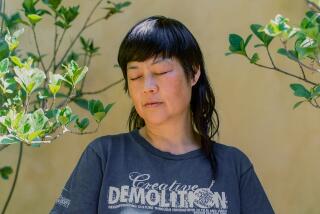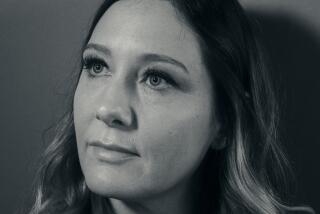An Oscar-nominated short exploring the menstruation taboo got its start at a North Hollywood high school
Reporting from Mumbai, India — In the village of Hapur, about 37 miles away from New Delhi, a young girl is asked what periods are. She giggles shyly and looks away. “I know what it is but I feel shy,” she says. “I can’t say.”
Shots of young girls and women laughing awkwardly, coyly and sometimes knowingly when talking about menstruation are at the core of “Period. End of Sentence.” — a documentary short nominated for an Oscar this year. The film, now streaming worldwide on Netflix, captures the taboo around menstruation in rural India and the efforts of one group of high school students from North Hollywood to start a conversation.
The shame surrounding menstruation in rural India means that misinformation abounds and often even elderly women cannot explain what causes periods. It is a subject discussed in hushed tones, if at all.
During their period, Indian women are often barred from entering temples and kitchens and made to sleep separately from their family because of the perception that they are impure. It is seen as an illness — as it is described by a young man in Hapur interviewed in the documentary.
This stigma was at the center of India’s most recent battle for women’s rights. In 2018 India’s Supreme Court ruled that it was unconstitutional to bar women between 10 and 50 (those considered to be of menstruating age) from entry to Sabarimala, a famous Hindu temple in India. This rule was instituted on the grounds that the temple’s deity, Lord Ayyappa, is considered celibate.
The ruling enraged religious conservatives in India, and when two women made history by entering the temple last month, violence followed and the head priest carried out a “purification ritual.” Speaking of the controversy, the cabinet minister Smriti Irani likened it to carrying “sanitary napkins seeped in menstrual blood” into the house of God.
Lack of access and affordability means that only 12% of India’s 355 million menstruating women use sanitary napkins, according to a 2011 study by Nielsen. Most women are forced to use old cloth or rags. The lack of access to sanitary napkins makes it difficult for young girls between 12 and 18 to continue their education once they get their period. About 23% of girls in this age bracket drop out of school after they start menstruating.
This is the issue that the Pad Project, a nonprofit started by the students of Oakwood School, attempts to address. In 2012, Melissa Berton, a teacher at the school and a producer on the film, learned about period inequity while attending a session at the United Nations.
COLUMN: Film and TV are slick with blood and guts, but periods? Still taboo »
There, she heard about Arunachalam Muruganantham — made famous by the Hindi movie “Padman,” also available on Netflix — who had invented an easy-to-operate machine that can manufacture sanitary napkins using locally sourced, natural materials and a small amount of electricity at the cost of approximately 5 cents a pad.
Burton brought these issues to the students at the school’s chapter of Girls Learn International, and they decided to launch the Pad Project to start a conversation about menstruation by installing one of Muruganantham’s machines in India and documenting their journey. The students partnered with Action India, a nonprofit based in New Delhi, which worked with them on the ground in India and helped identify a village that would benefit from one of Muruganantham’s machines.
The students raised about $55,000 through a combination of two Kickstarter campaigns, bake sales and yoga-thons to fund the machine, supplies and filming. They then hired Rayka Zehtabchi, the director of the project, who recently graduated from USC’s film school.
“I walked into a room and realized my executive producers were a group of 16-year-old high school girls,” said Zehtabchi, adding that she found the students’ ambition and optimism infectious. “I think that made me feel even more connected to the project.”
In 2016, when Zehtabchi traveled to India to film the installation of the machine, she encountered the taboo against menstruation firsthand. “Speaking to our subjects was incredibly challenging because nobody wanted to talk to us about periods,” she said. “We had to do a lot of work to break the ice and get our subjects to trust us.”
The film includes a moment when one of the male members of the family whose home the machine is installed in is asked what the pad machine does. He sheepishly responds that he thinks it makes children’s diapers. The women working on the machine say that they thought it best to keep him in the dark.
In another instance, Zehtabchi shows up unannounced at a school in Hapur and asks the teacher to have the students describe what periods are and an uncomfortable silence follows.
For the women of Hapur, the economic opportunity that the machine represents is as empowering as the sanitary napkins it produces. The sanitary napkins are manufactured, sold and distributed by local women, many of whom have never had the chance to work before. When Zehtabchi returned to Hapur, six months after the machine had been installed, she noticed a marked change in the women’s confidence and behavior toward menstruation.
Mason Maxam, one of the Oakwood students involved in the Pad Project, said the idea behind making a documentary about their project was that it could be used to spark a dialogue at other schools. So far, 40 other schools have reached out to Oakwood to partner on the project.
Since the film was released last year, the students have installed two more pad machines in neighboring villages and hope to install several more across the world. Maxam, who had the opportunity to travel to India and screen the film in Hapur, hopes to help establish a program so that high school students could visit the villages where the machines are installed and learn from the women there.
The Pad Project has had an impact in the Oakwood community as well. “Being part of the Pad Project has really changed my ability to talk openly about periods and women’s issues in a way I never have before,” said Maxam. “While we put pad machines into different villages worldwide, we are also helping the stigma here in the States by just talking about it, just by being here.”
More to Read
Only good movies
Get the Indie Focus newsletter, Mark Olsen's weekly guide to the world of cinema.
You may occasionally receive promotional content from the Los Angeles Times.










